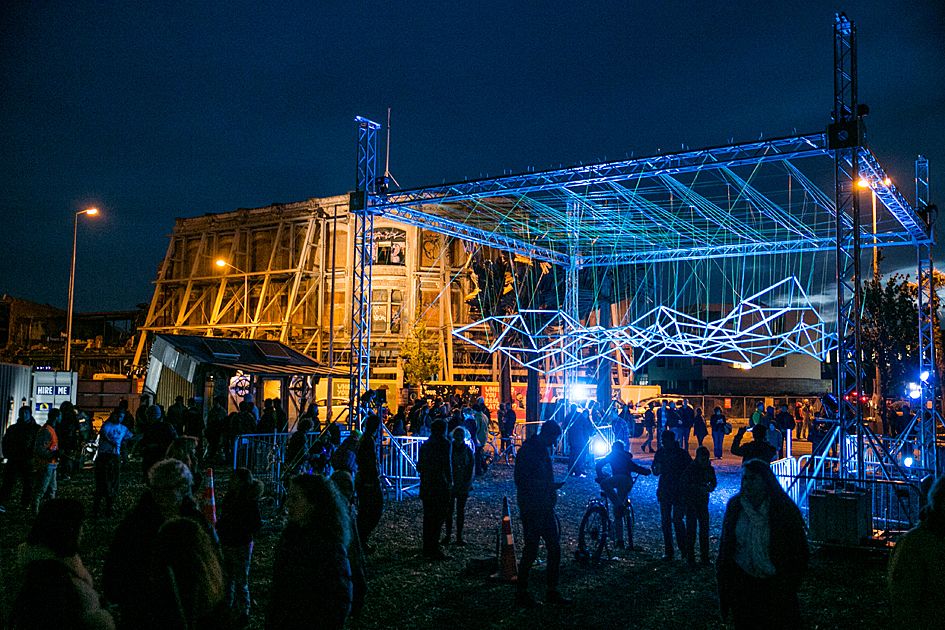Pantograph Picks: FESTA 2016
Our recommendations for Christchurch's Festival of Transitional Architecture
My grandparents were born and raised in the northern suburbs of Christchurch. Work and family drove them steadily north to Auckland, where they live now. They were safe from the quakes that hit in 2010 and 2011 and brimming with stoic perspective about their own good luck. They were also quietly devastated to see the streets, halls, shopfronts and skylines that they associate with trips to town, first dances, going to the pictures, graduations, wedding receptions, in ruin. More than any sense of heritage in the built environment itself, it was the psychogeographic wipeout that a quake on this scale brings. Christchurch as it stood was a enduring placeholder for memories that can feel temporal and precarious otherwise.
Little can be done to magic my grandparents' city from memory to form, but it can be honoured by a rebuild that conceives of cities as a place that fosters community and interaction and allows for lasting and positive associations between space and person. This weekend's Festival of Transitional Architecture (FESTA) is about celebrating the resources in Christchurch's here and now, but it also asks the very serious questions about what the place will look like in 5, 10 years - and beyond. Here's our top picks - Joe Nunweek
Lean Means
FESTA's theme this year is "We Have The Means", which they describe as a focus on "making the most of the resources available to us - in terms of our people (and their skills and knowledge) and reusable materials. The centrepiece, Lean Means, is a temporary city constructed in the vacant sites around the Christchurch Art Gallery. A night market will operate alongside several light installations and pieces created by art and design students across Australasia (previously, these pieces have been big, fun and populist - 2014's Orbis, a luminous University of Auckland project, was absolutely world-class). Saturday 22 October will set it pay host to a street party from 5pm-11pm.
Freerange's Bureaucratic Love Session
A almost childish and self-negating contempt for public institutions has been a long-time obsession of the libertarian right here and elsewhere, but ordinary people who think Von Hayek was a popular logo on early 2000s trucker caps have plenty of reasons to fear and mistrust New Zealand's bureaucracies too. That's particularly the case in Christchurch, where residents have often felt like the decisions about compensation and access remained hellishly opaque.
Freerange Press's Bureaucratic Love Session(Sunday, 1-4pm, Space Academy) puts forward the reasonably brave proposition that it doesn't have to be this way - that we can develop a more nuanced and caring approach to institutions and their workers that realises their original intentions and sweeps away the cynicism that media and politicians themselves foster about public services. Expect some good ideas, and hopefully a little bit of pushback too - for all the love talk, this is a inherently social democratic project that requires some tough questions.
Lost Christchurch
As some perspective on Auckland's most hyperbolic NIMBY fears (the St James will be replaced by a Nandos; the Ferry Building will give way to a bare concrete slab for rude teens to tag dicks on) Christchurch lost over 130 heritage buildings and counting from September 2010 onwards. The city's Heritage Fund manages expectations as it assesses priorities, its manager indicating their ultimate deference to private landowners and stressing pragmatism with the resources it has in an interview with RNZ last year. The Lost Christchurchsession (Saturday, 10-3, NZIA Canterbuary Branch Rooms) instead asks us to consider these buildings as a form of resource that's at real risk of going to waste, stressing the value of heritage architecture in ways that go beyond bottom-dollar terms.
Talking Books
This one's a simple but kinda lovely premise. Find a book and/or its topic that you're interested in (the end of the record store, childbirth, the Recovery) and set up a tete-a-tete to talk about it for 20 minutes with its author. In an era where writers and readers festival Q&As can't seem to avoid that one dude in the back ("My next question to you has two parts - the first part is a statement, and the second part isn't a question") it's a chance to have a conversation rather than witness a lecture). Go to the FESTA site to book in your session with Barnaby Bennett, Emma Johnson, Byron Kinnaird and others.
Zero Waste Ōtautahi
We've previously written on this site about the sort of future-oriented symposiums where people make nice about sustainability, only to leave human-height stacks of garbage in their wake. In contrast, this festival's local-level (but still reasonably lofty) initiative seeks to encourage an ongoing practice of waste minimisation, developing the first zero waste map of shops, markets and services for the city and track whether the map itself has any impact on trading habits. The extent to which it succeeds will depend a lot on community buy-in (that is, whether being zero waste acts as an sort of exclusionary in-crowd bit of branding, or becomes an inclusionary process that reduces barriers to entry for participants) - but there's no reason to think that those involved aren't aware of the challenges. Cities exist beyond moments, good or bad - it's good to see the festival trying to do the same.

